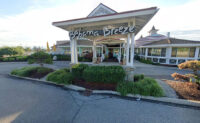Amid national shutdown, Bahama Breeze to lay off 62 in Woodbridge
Darden Restaurants, owner of the Bahama Breeze restaurant chain, announced Tuesday it is permanently closing or converting the Caribbean-inspired restaurants to other brands.
100 People to Meet in 2026: Hosts
Nourishing and delighting us, these Virginians welcome us to their communities through food, hospitality and entertainment.
Hospitality | Tourism 2025: ALBRECHT, CHRIS
In 2022, Albrecht assumed his current post overseeing the Danville casino, which opened in December 2024. The $800 million Caesars Virginia resort, with 1,200 employees, is the third permanent casino to open in the state, although a temporary venue was previously in operation. The property includes more than 90,000 square feet of gaming space, with […]
Hospitality | Tourism 2025: BRADBURN, DOUG
One of the most visited historic estates in the nation, Mount Vernon receives about 1 million visitors annually. Bradburn is overseeing a privately funded preservation project to ensure the structural integrity of George Washington’s mansion for decades to come. The $40 million project, which started in 2023 and will stretch to 2026, includes designing and […]
Hospitality | Tourism 2025: TERRY, ERIC
With four decades of hospitality experience, Terry has advocated for the Virginia Restaurant, Lodging & Travel Association’s 1,500-plus industry members since joining as president in 2014. VRLTA and Virginia Tourism Corp. announced in June that the 2026 VA1 Governor’s Tourism Summit — an annual gathering of 500-plus tourism professionals — will be at the Kalahari […]
Hospitality | Tourism 2025: COLEMAN, CHRISTY S.
As head of the foundation administering two museums of early American history, Coleman is at the forefront of educators weaving a nuanced and inclusive story of American history. She is the first woman and the first person of color to serve as executive director of the state agency that operates Jamestown Settlement and the American […]
Hospitality | Tourism 2025: KNIGHT, JUSTIN
As CEO of Apple Hospitality, a publicly traded real estate investment trust, Knight oversees more than 220 hotels, mainly Hilton and Marriott brands, across 37 states and Washington, D.C. He joined the company in 2000 and took over from his father, founder Glade Knight, in 2014. The elder Knight serves as the REIT’s executive chairman. […]
Hospitality | Tourism 2025: JAIN, AKHIL
Jain has run Landmark Hospitality Group for over a decade. With nearly 500 employees, the hospitality company manages, owns and develops hotels in North Carolina and Virginia under brands such as Marriott, Hyatt and Radisson. The company also expanded into housing in 2021, developing a 287-unit luxury apartment complex in Hampton. As part of the […]
Hospitality | Tourism 2025: HARDIE, MOLLY AND ROBERT
H7 Holdings is a private family investment company that owns and manages Keswick Hall and Golf Club in Albemarle County and the Hermitage Hotel in Nashville, Tennessee. Venture capital firm Level One Partners invests in the health care and life sciences sectors. The couple also runs the H7 Foundation, supporting educational and nonprofit endeavors, and […]
Hospitality | Tourism 2025: BALTIMORE JR., THOMAS J.
Park Hotels & Resorts fell off the Fortune 1000 list this year, after ranking No. 957 in 2024. The lodging real estate investment trust reported more than $2.59 billion in 2024 revenues, down from more than $2.69 billion in 2023. Nonetheless, it had a 2.9% year-over-year increase in comparable and total revenue per available room. […]
Hospitality | Tourism 2025: CARROLL, JAMES
A former Navy fighter pilot with a Harvard MBA, Carroll parlayed his financial management expertise into running one of the largest independent hotel operators in the country. Founded in 2000, Crestline Hotels & Resorts operates about 18,300 rooms in 28 states and Washington, D.C. In January, the company announced its acquisition of Five Senses Hospitality’s […]
Hospitality | Tourism 2025: MCCLENNY, RITA
A Southampton County native, McClenny has been working to bring tourism and film productions to Virginia since 1991. She ran Virginia Film Office, a division of the Virginia Tourism Corp., for two decades before becoming president of the state agency in 2012. As Virginia Film Office head, McClenny was responsible for bringing high-profile TV and […]























